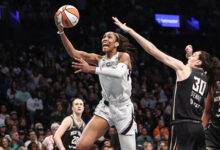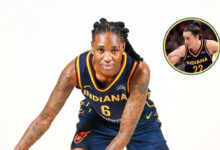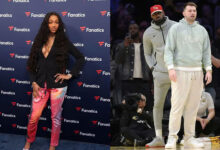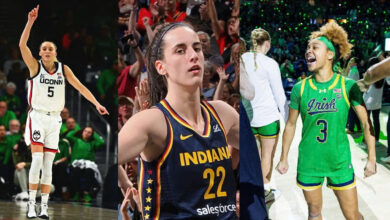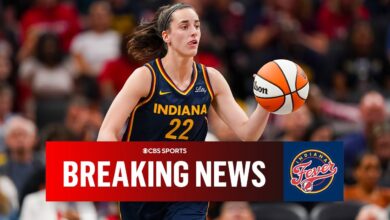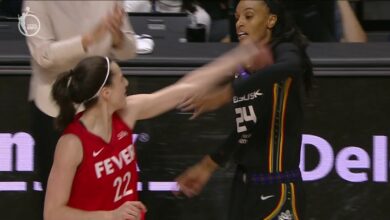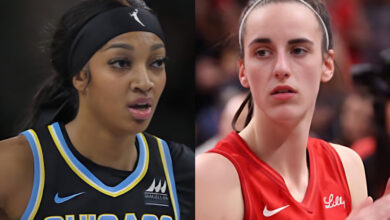Caitlin Clark and Angel Reese Deserve More Respect and Recognition
Caitlin Clark and Angel Reese Deserve More Respect and Recognition
The Caitlin Clark and Angel Reese rivalry has been a central W.N.B.A. story line this season. The two most-watched games have been between Clark’s Indiana Fever and the Chicago Sky, Reese’s team, even though both players are rookies. And they’ve received a tremendous amount of media coverage and discussion on sports media shows.
Much of that conversation has focused on whether the W.N.B.A. has been sufficiently grateful for the attention Clark has brought to the league or if Reese and others are jealous of her blossoming stardom. The attention echoes the Larry Bird vs. Magic Johnson rivalry that helped spur the growth of the N.B.A. in the 1980s.
The clashing of great players is essential to sports and has defined the men’s game for decades: Bill Russell vs. Wilt Chamberlain, Shaquille O’Neal vs. Hakeem Olajuwon, Michael Jordan vs. Isiah Thomas, LeBron James vs. Stephen Curry. Rivalries can often involve a bit of class, region and race. Nonetheless, they usually come down to the one-on-one competition itself.
This is what makes the Clark-Reese comparisons so odd. Many basketball rivals play the same position or at least inhabit similar parts of the court. To oversimplify, post players who stay closer to the basket are usually compared to other post players. Those who run the offense are often pitted against others who do the same. Shaq and Hakeem, for example, were both centers. But Clark plays a perimeter game, and Reese plays in the post. Clark at last count had made 120 3-pointers. Reese had attempted 16, and she had 446 rebounds to Clark’s 222.
And so instead of a conversation about the differences in their play, race has come to dominate the chatter surrounding these women. Some of the talk has been both racist and sexist, trading in stereotypes about Black and white women. Reese has often been cast as the angry Black woman while Clark has been portrayed as the innocent victim needing protection.
It can be traced back to the 2023 N.C.A.A. tournament. Clark’s brashness had become the subject of some conversation. It reached an even higher level in the semifinals when Clark, playing for the University of Iowa, made a dismissive gesture toward the University of South Carolina’s Raven Johnson, not bothering to guard her at the three-point line. In the final game, in which Louisiana State University beat Iowa, Reese celebrated at Clark’s expense — waving her hand in front of her face — a move that Clark herself has made, perhaps to mean that her opponent couldn’t see her. Reese also pointed to her ring finger, seemingly signifying the championship ring coming to her.
Rather than this being treated as a passing moment in the heat of competition, Reese was called “classless” and worse than an “idiot” by one commentator. Reese said that she received racist messages. And condemnation of her exploded on social media, leading many athletes and commentators — including Clark — to come to Reese’s defense.
Clark is a great player and is having a rookie season for the ages. But some Clark supporters have not stopped at lauding her greatness — they’ve also taken to discrediting Reese’s accomplishments to make Clark stand out all the more. For example, Reese recently broke the record for most rebounds in a season by any W.N.B.A. player. Some people argued — wrongly — that the only reason she had the record was because she rebounded her own missed shots.
To be clear, I don’t blame either Clark or Reese for this nonsense. As much as sports are an opportunity to bring people together in the celebration of acts of athletic prowess, they can also reveal the darker parts of our nature. After the 2020 European Championship, three Black players for the English national soccer team were subjected to racist harassment after they missed penalty kicks. In 2023, the University of Alabama condemned some of their own fans’ chants that were directed at three Black football players from the University of Texas. This year, the University of Utah women’s basketball team had to switch where they were staying before an N.C.A.A. Tournament game because of hate speech they endured while staying at a hotel.
A recent injury ended Reese’s season. I am hoping that next year we can do better than having to praise one player at the expense of another. We could do what we usually do in the men’s game — pit these two against players who play similar positions to them. There are plenty of better fits available. Arike Ogunbowale, the two-time W.N.B.A. All Star Game Most Valuable Player, is a guard who is not far behind Clark in three pointers made. A better comparison for Reese would actually be Clark’s teammate and fellow all-star Aliyah Boston.
Sports media could also provide more coverage for two-time M.V.P., back-to-back W.N.B.A. champion A’ja Wilson. The W.N.B.A. has plenty of story lines if we are not too lazy to seek them out.
One thing that Black people in America learned long ago is that just because the culture creates a narrative about you, we don’t have to follow it. I trust that these two women will find a way to tell their own stories. It’s up to us to listen.

